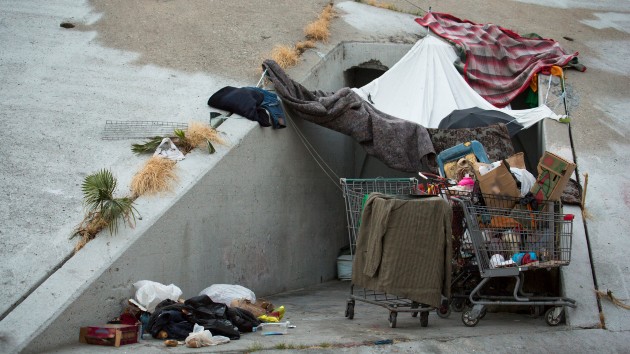 MattGush/iStock(NEW YORK) — While government officials and health experts are advising the public to “stay home” and “stay inside” as the novel coronavirus has spread, that is not an option for the nation’s vast homeless population.
MattGush/iStock(NEW YORK) — While government officials and health experts are advising the public to “stay home” and “stay inside” as the novel coronavirus has spread, that is not an option for the nation’s vast homeless population.
“Social distance is a luxury that the homeless can’t afford,” said Shirley Raines, founder of Beauty 2 The Streetz, a nonprofit that provides services to homeless people on Skid Row in Los Angeles. “There are 60,000 homeless people in L.A. that have nowhere to go.”
As the government began issuing warnings about social distancing, Raines continued to serve the homeless in her community by providing them with hand sanitizer, Vitamin C and warm meals.
For three years, Raines and her staff have provided the homeless in Skid Row with showers, food and beauty supplies. Since early March, the organization has been serving the community from their cars, in an effort to follow social distancing guidance.
“I think the homeless are a forgotten community,” said Raines. “When coronavirus started getting bad here, the homeless that I help were reaching out to me, telling me that no one was helping them.”
While several states have adopted changes that include the closure of non-essential businesses and schools, few have announced steps to protect the homeless from COVID-19.
In California, at least seven homeless shelter residents have tested positive for the new coronavirus, according to Gov. Gavin Newsom. The state, which has the largest homeless population in the U.S., authorized $150 million in emergency funding to protect the homeless there from the spread of COVID-19.
The funds will go to local governments for shelter support, emergency housing and for leasing rooms in hotels and other facilities.
But that kind of support is not seen everywhere.
Freezing Nights in Tacoma, Washington, and Bethany House in Rochester, New York, are two facilities that have had to close in order to adhere to safety precautions over social distancing.
New York is one of several states that have identified shelter residents who tested positive for the new coronavirus. According to the New York Department of Homeless Services, as of Sunday night, there were 17 coronavirus patients identified from 12 different shelters across the city. The overall number of homeless residents in New York in 2019 was 78,604, according to the U.S. Department of Housing and Urban Development.
“This is a tough time for all New Yorkers, especially those who are experiencing homelessness,” New York City Council Speaker Corey Johnson told ABC News.
Johnson demanded last Friday that Mayor Bill de Blasio provide portable toilets, hand washing stations and showers to people living on the streets.
“We need to make sure homeless New Yorkers and the staff that care for them remain safe and healthy,” Johnson said. “We must make sure they have all they need to help flatten the curve.”
As of now, the only response has been from the Department of Homeless Services that has issued guidance for shelter providers.
“The future of homeless shelters is uncertain,” said Constance Collins, president of Lotus House in Miami, the largest women’s shelter in Florida. “We are struggling to find resources to pay for supplies and food.”
The Miami shelter houses 480 women and children and also provides family counseling, educational support and job training.
Since learning about the coronavirus in January, staff members have taken precautions to keep their residents safe. Temperatures are taken, communal activities are limited and social distancing is enforced.
“We are still doing activities while practicing 6-foot social distancing but it’s especially hard when you have 250 children in one place,” Collins said.
While some school systems are closing down for the remainder of the year to reduce the number of coronavirus cases, there is still a threat to the elderly and those with weaker immune systems.
In 2018, there were 552,800 homeless people in the U.S., according to the National Alliance to End Homelessness. And nearly one-third, are over 50.
“Every weekend, I encounter hundreds of elderly whose families are no longer here and it’s scary to think they are on the streets being exposed to the coronavirus,” Raines said of the community she works with in Los Angeles. “The homeless community shouldn’t be forgotten, they need protections too.
Copyright © 2020, ABC Audio. All rights reserved.

